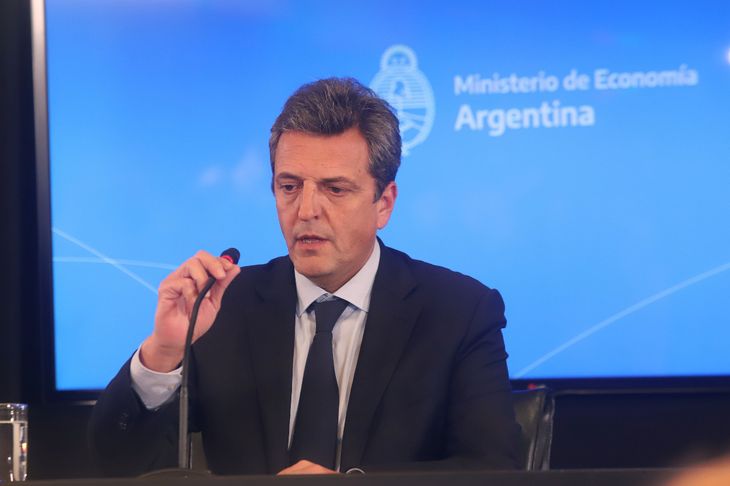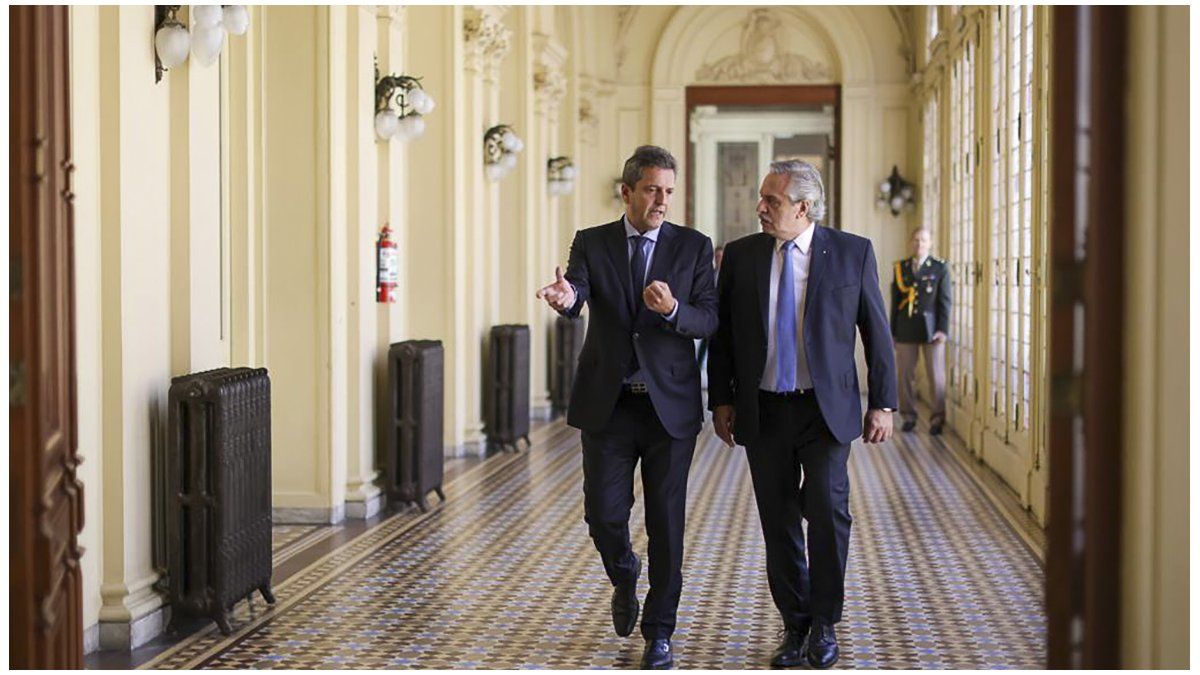Some might think that with the removal of Guzmán an internal situation of disputes and misunderstandings between the majority members of the ruling alliance was settled; however this was shown that it was not so. The incorporation of Daniel Scioli Y Silvina Batakis to the Ministries of Productive Development and Economy, serve as clear examples that the internal political situation of the ruling party continued unresolved.
BATAKIS CONFERENCE 2.jpg
TV Capture
Both protagonists were shown by the government, as two officials who would come to remain in their positions for as long as necessary to improve the economic and productive situation of the country; In fact, much emphasis was placed on the background and expertise of the former minister, as well as the former governor of Buenos Aires. However, a few days after her assumption, it could already be glimpsed that her efforts were beginning to show little encouraging results. Neither Scioli nor Batakis, in their more than forty days of management, were able to show glimpses of safety, efficacy and efficiency in their determinations. Perhaps, to try to be somewhat fair, we could say that the former Minister of Economy tried to create an acceptable impression with the current Executive Director of the IMF, but that we know at this point in the circumstances, that it was very inconsequential for the market and the local economic power groups. Similar luck ran the Daniel Scioli when trying to find agreements with price makers in the food industry.
Faced with this context in which the figure of Batakis was plundered both inside and outside the government in an almost constant manner and with a Daniel Scioli that seemed somewhat out of timing regarding his new role as minister, and with a movement that we could say of survival, the transcendental actors of the front of allresolve Sergio Massa’s incursion into the national government, with an extremely leading role, given that by bringing together three ministries under his orbit, he generates, in my opinion, what we could define as a two-sided government.
Why two-sided government?
Because it is clear at this stage of the circumstances that his actions will not be subject to the control of the Chief of Staff, John Manzurand that even this task cannot be carried out by the president himself Alberto Fernandez. If this forecast were to occur, the logical question would be, is a government with this particularity viable?
To go back to a similar antecedent, we must go back to the landing of Sunday Horse in the government of Carlos Menem. Although it is true that as a result of an economic and inflationary crisis in the government at that time, Cavallo was anointed with a leading role as super minister, we cannot help but analyze that the political conditions were very different. The leadership of Carlos Menén within the government and within the PJ party it was out of the question for both the ruling party and the opposition.
the minister Sunday Horse He was an economist with a technical profile, closely linked to the economic establishment of that time, but who did not have the slightest political trajectory and even less political weight or electoral wealth.
CARLOS MENEM AND DOMINGO CAVALLO.jpg

The third factor of importance was a political opposition headed by the Radical Civic Union that was very weakened in political, electoral and credibility terms, as a result of the end of the government of Raul Alfonsin, a context that was more than enough to leave her very conditioned against a Peronist government that closed ranks behind its new leader. These three factors that I have just described and that existed in the experience of Cavallo’s incursion as superminister, today are diametrically opposed.
The leadership of Alberto Fernandez regarding the management of his government and his specific weight within the front of all In addition to their image in the electorate, they are clearly deteriorating and in a sustained manner without any indicator that seems to improve said situation; Serge Massa It has a political and territorial weight that today is clearly greater than that of the president of the nation.
The opposition led by Together for Change is consolidated and has just won the last mid-term elections; Likewise, public opinion polls place it as the political force with the highest percentage of acceptance with a view to next year’s elections. As we can see, the context and conditions of the actors are diametrically opposed.
That said, it is important to note that with the addition of Serge Massa in his capacity as superminister, some questions arise within the government that deserve special attention.
WhatsApp Image 2022-08-03 at 5.54.28 PM.jpeg

President Alberto Fernández during the swearing in of Sergio Massa as Minister of Economy.
Ignatius Petunichi
The first of the questions is whether Sergio Massa will have to respond organically not only to the current chief of staff, but even to a president who is clearly weakened and with an ostensible lack of political leadership. The second question is whether the national government will not become a series of watertight compartments, which could be identified with the Albertists on the one hand, the Christianists on the other, the governors in the person of the current chief of staff and finally , the recently appointed minister using great political power to try to impose his opinion on the rest of the aforementioned actors. The third question is whether the vice president is in fact in complete agreement with this new government structure, or if, on the contrary, her silence leaves more doubts than certainties and, consequently, undermines any possibility of developing a political and power pole. different within the government.
Faced with these questions, the question is why the incursion of Serge Massa, can become the current government in two faces. The answer has more than one edge. The first of them is perhaps the most predictable and has to do with the effective and real use of the power with which he was anointed. Serge Massa upon being appointed to his ministerial role. If this situation were to occur, it is more than clear that the government would have within itself an actor with enough weight to become a clear pole of power to the detriment of presidential power. The second edge has to do with the success in the management of the new minister; If such a situation were to occur, it would generate by its own inertia a context of real and solidified power that would further weaken the presidential figure and consequently place him as an undeniable presidential candidate for next year.
Serge Massa

Ignatius Petunichi
The third edge has to do with an internal one of the ruling party and that generates the albertistas, the Peronist governors and the cristinismo as an extreme of power opposed to the pole of power that represents the own Serge Massa; It is true that this situation seems the most unlikely of all, but in a context such as the current one, it cannot be ruled out, given that in the event of a success for the new minister, the electoral luck of the president and vice president would be cast and that could generate a certain resentment difficult to quantify more than a year before the presidential elections. The truth is that in any of the hypothetical scenarios described, the government with the incorporation of Sergio Massa, can become a two-sided government.
The socioeconomic situation of the country does not give the government room to commit missteps or continue pretending cabinet changes with the desire to achieve relaunches that in practice are not. The prevailing and pressing situation requires concrete, effective and efficient actions to improve the situation we are going through as a nation and it is the government’s responsibility to take due account of this. The previous experience regarding the incorporation of a superminister turned out to be successful for the government of that time.
The current experience of the incorporation of a superminister offers some doubts that only time will dispel or confirm. Today venturing a result is at least irresponsible; The final result will depend on the course of events and the behavior of the actors. We, the citizens standing up, will once again be spectators of a situation whose result, for better or worse, will affect us directly.
Source: Ambito




